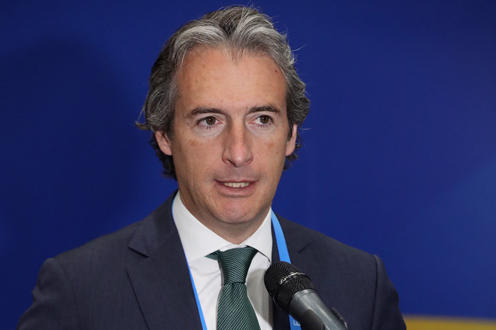Íñigo De la Serna calls for the EU to increase the amount of subsidies of CEF funds to make further progress on highways and railways
News - 2017.9.20
The Minister for Public Works declared his support for the Connecting Europe Facility - CEF, used since the year 2014 to fund projects under the Trans-European Transport Network, which has been successful in making progress with the main transport corridors.
With a view to preparing for the new financing framework beyond the year 2020, Íñigo de la Serna called for this facility to continue to be employed, providing CEF II with a sufficiently high budget so as to undertake the work pending to complete the so-called core network by 2030 based on the needs detected by Member States.
On another note, the minister backed the continued boost to the use of innovative financial instruments for implementing the network.
Spain's financial provision to finalise the core network in our country by 2030 amounts to 50 billion euros, 10% of the estimated total value of the core network in the European Union.
This is complemented by the additional financing that Spain receives from other European bodies. One example of this is the additional investment of 1.03 billion euros that the European Investment Bank (EIB) recently allocated Spain to build the "Basque Y" high-speed railway line. This loan comes on top of the 1.4 billion euros already paid out.
Spain makes progress on corridors
During his speech at the first session of the informal Transport Ministers Council meeting, Íñigo de la Serna also highlighted Spain's leading role in boosting work on the Mediterranean and Atlantic Corridors in recent years.
As regards the Mediterranean Corridor, this action exceeds the sum of 17.9 billion euros, of which 13.68 have already been implemented. Hence, an investment of close to 4.2 billion euros is being mobilised at this time on different stretches of the corridor, which represents a very major investment by the Ministry of Public Works.
He also pointed out the commitment by the Ministry of Public Works to the development of the works on the Atlantic Corridor and underlined that this model of corridor in Spain has proven to be highly effective. On this point, he also mentioned the importance of the figure of railway corridor coordinators. Spain has had its own Mediterranean Corridor coordinator, Juan Barios, for some months now, who collaborates and is in permanent contact with the different regional governments and social and economic stakeholders of the different regions that this key infrastructure runs through.
In this regard, it is scheduled that within the framework of the Transport Ministers Council, the coordinators of the corridors will present a manifesto to boost the development of these infrastructures, which will be backed by Spain.
Air connectivity
Furthermore, at a meeting on air connectivity, the European Commission and Eurocontrol presented a new report on developments in different countries.
It is very important for Spain to have optimum levels of air connectivity, not only to promote international traffic but also to guarantee communication between all its regions.
Spain is currently enjoying a period of growth in its air transport activity. A record figure of 230 million passengers used Spanish airports in 2016.
Non official translation





